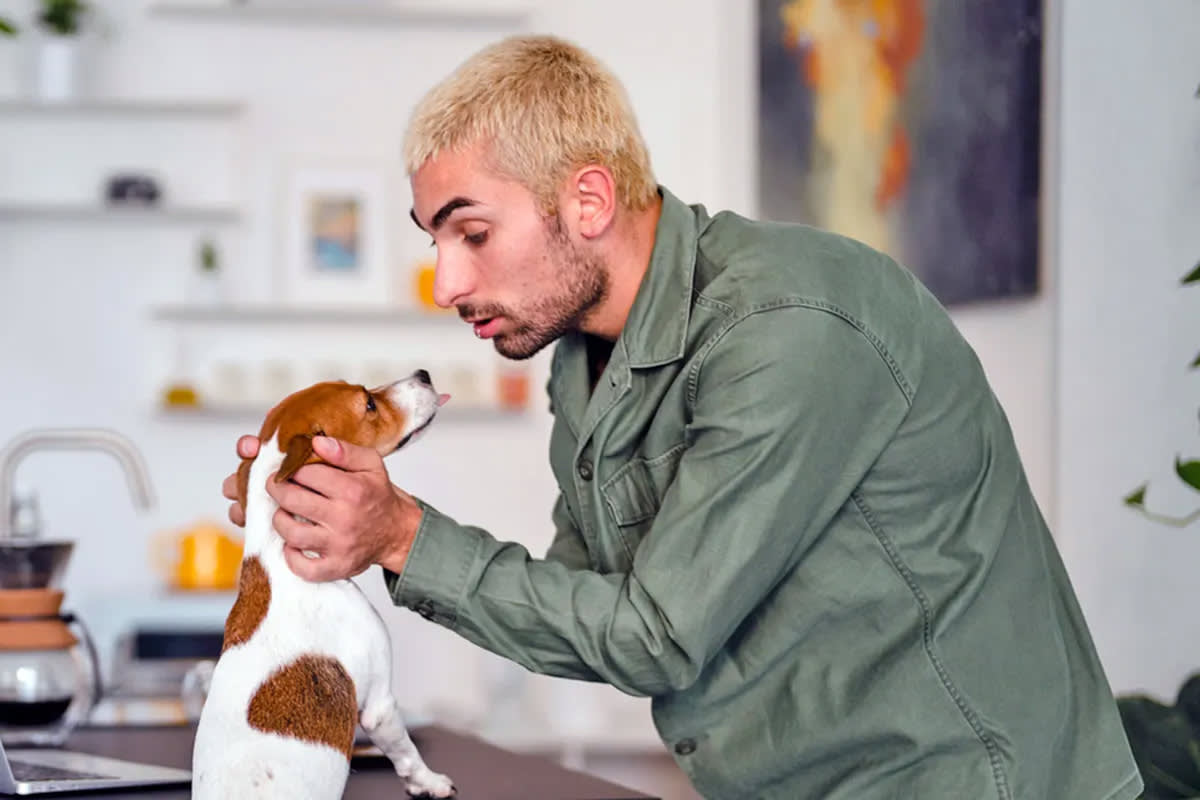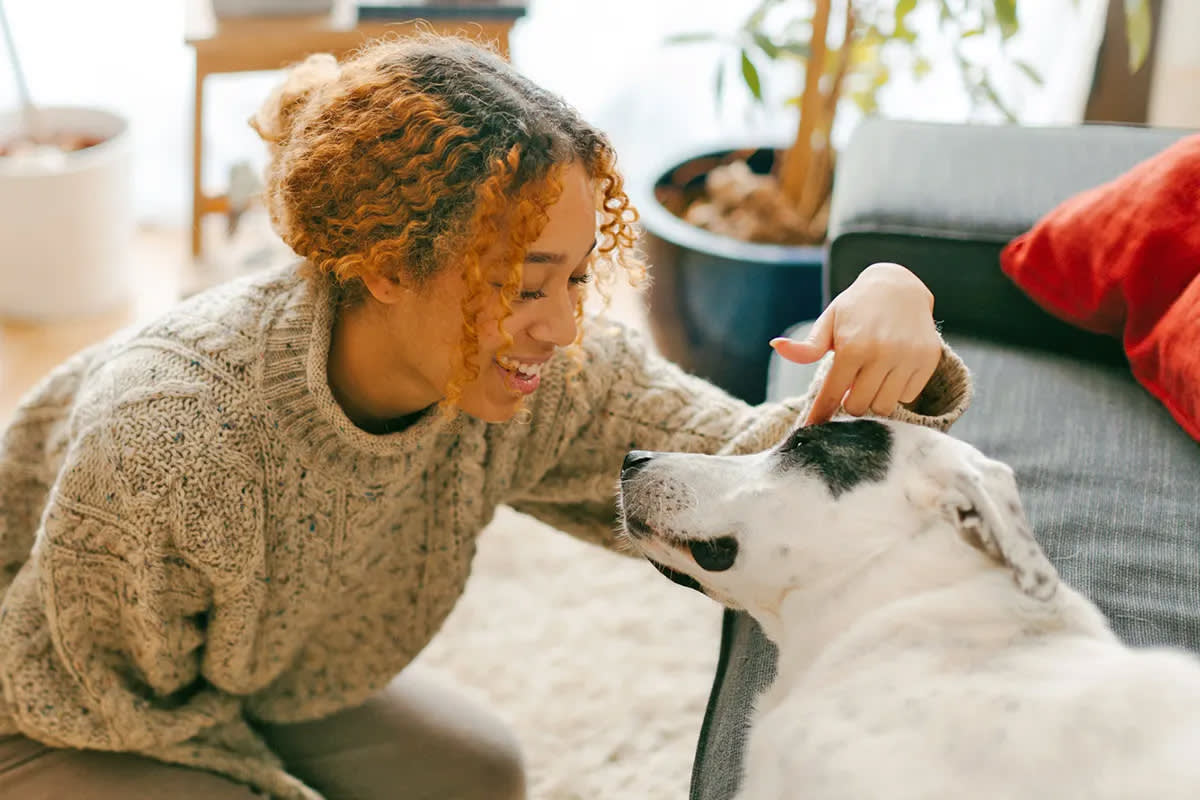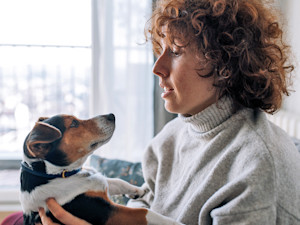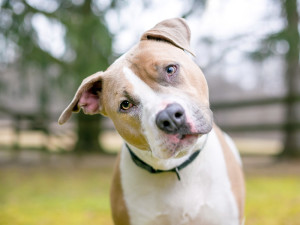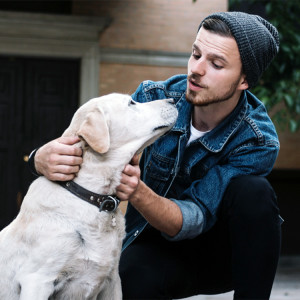How Your Dog Actually Feels About All Those Silly Nicknames You Give Them
A friend named Mr. Snuffleupagus has some thoughts.
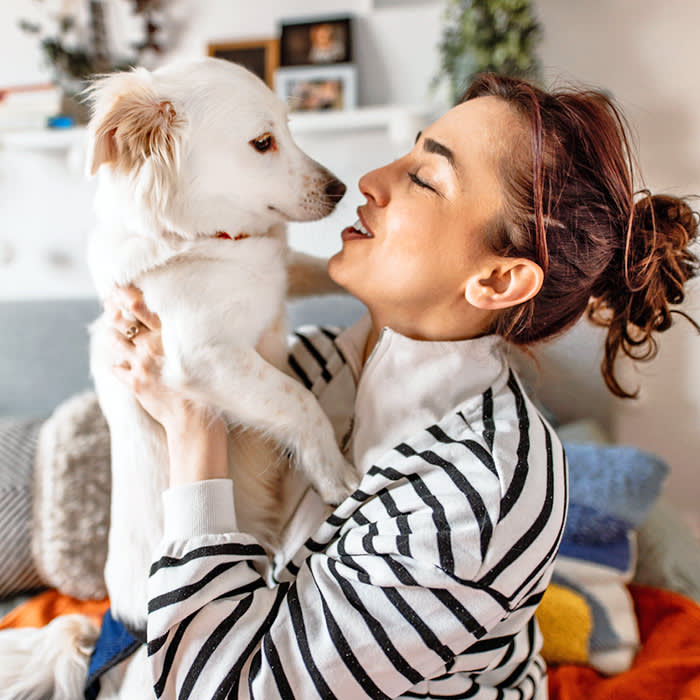
Share Article
Like any good pet parent, I have roughly 1.3 million nicknames for my dogs, and almost none of them have anything to do with their actual names. My older pup, Frasier, also goes by the name Bubba, Bubba Newman (don’t ask), Bubsy, and Bubby, and his younger sister, Rosey, is also known as Rosebud, Rose Bush, Ms. Bush, Bush Baby, Bush Baby Bongo, Ms. Carbungalo, Ms. Bonk, Bonky, Baby Bonk, Bonk Baby, Bonkerella, Ms. Bink, Binkley, and… Carmine. (Again — don’t ask.)
As with most pet names, each of these aliases carries enough lore to make even J.R.R. Tolkien flinch. But every now and again, as I catch myself testing out a new variation, I wonder if my dogs will ever reach their limit and stop responding entirely. Do dogs appreciate a good inside reference like our human friends do, or is there something to be said for keeping One Name to Rule Them All?
After consulting with experts, I’m happy to report that giving your dogs an egregious number of nicknames will not do any lasting psychological damage. In fact, there might (might!) be reason to believe that a nickname can even reinforce an exclusive shared context between you and your dog, evoking your special bond each time you use it.
At the very least, everyone agreed that this very cute practice means a lot to us — and sometimes, that alone is enough to make it worthwhile.

How do dogs understand their names?
What’s in a name? For a dog, that answer is not entirely clear.
Dr. Zachary Silver, director of Occidental College Canine Intelligence Lab, says science has yet to establish how much of a sense of identity dogs really have. “Identity comes from a sense of consciousness,” he says, “which really gets into a big debate that I think is bigger than psychologists want to really tap into.”
What we do know is that dogs can learn names fast — which suggests that they have at least some understanding about what those names mean. Dr. Stanley Coren, professor emeritus of psychology at the University of British Columbia and author of How To Speak Dog: Mastering the Art of Dog-Human Communicationopens in new tab, notes that dogs “live in a sea of human noises.” So the most functional aspect of their names is commanding their attention.
For example, Coren says, he can ask his wife if she wants to “come over here and sit down,” and his dog will know he did not just ask him to “come,” “sit,” or lie “down.” That’s because Coren didn’t call him by name. “Proper grammar in talking to your dog is, ‘Lassie come, Lassie sit, Lassie down,’” Coren says. “Once you've made eye contact after the name, then you don't have to repeat the name.”
And as for whether dogs also understand their names as representations of their essence? “I personally don’t really think that the distinction matters,” Silver says. “It seems like they understand the latter, which is the more functional part.”
Why do we give our dogs silly nicknames?
Why do we give anyone a nickname? Because it’s fun! But according to Dr. Valerie Fridland, professor of linguistics at the University of Nevada and author of the book Like, Literally, Dude: Arguing for the Good in Bad Englishopens in new tab, dog nicknames and the baby talk that often inspires them can serve a deeper purpose as well.
When we talk to kids and puppies in that special sing-song-y, rhyme-y-whime-y way, Fridland says, “We’re showing them through our altered forms of language that we have an intimacy that doesn't exist compared to the way we talk to other people.”
You wouldn’t grab your boss’s cheeks and call him Mr. Snuffleupagus, but we do it with our pets because we share a special bond. So, when we use baby talk or come up with imaginative terms of endearment for our dogs, Fridland says, “We’re embracing them through language.” The more familiar we are with a person or pet, the more likely we are to use a variety of nicknames.
And as for why we choose certain nicknames for our pets and not others? Linguistics offers at least some clarity there, too. It turns out, “sound symbolism” can help inspire some of the names we might use with our dogs. For instance, Fridland explains, “It seems to be an inherent human tendency to name small objects, young objects, cute objects, or child-like objects with the ‘ee’ vowel.” (Think: Baby, Fluffy, and Lucky.)
Apart from sound symbolism, Fridland says, the main thing that tends to distinguish dog nicknames from humans is that dogs will tolerate a lot of names that our human BFFs certainly would not — like, say, “Stinky.” Something tells me we won’t be tossing that one around at brunch any time soon.
Do nicknames confuse our dogs?
Put simply, not really. Coren and Silver agree that dogs are pretty flexible when it comes to their names, and even names for other objects.
As Coren points out, Treasure Island author Robert Louis Stevenson famously kept a Skye Terrieropens in new tab whose name shifted from Woggs, to Walter, to Watty, to Woggy, and then, finally, Bogue. Coren himself has also renamed some of his own dogs — including a male Cavalier King Charles Spaniel who came to him as Banshee before Coren renamed him Bam Bam. (“I’m a university professor,” Coren explains, “and the idea that a male Scottish dog was named after a female Irish ghost drove me crazy.”)
For most dogs, learning a new name doesn’t take long. Coren reports that Banshee became Bam Bam in less than three days. And sometimes, there can be therapeutic reasons to rename a dog, like if they came from a shelter and might have been abused. As another example, Coren recalled a Nova Scotia Duck Tolling Retriever he once renamed from Dancer to Scamp as the dog’s hearing deteriorated. (“Scamp” was simpler and easier to hear.)
“The vast majority of dogs will pick up whatever term you use around them as being the equivalent of a name,” Coren says. “I have a suspicion that a whole bunch of dogs out in the world think that their name is ‘No.’”
Do nicknames deepen our relationships with dogs?
Sadly for all of us creative nicknamers, dogs probably don’t appreciate a good pseudonym quite as much as people do. As Silver gently puts it, “My sense is this is more of a human-serving element of our communication with pets.”
Still, it’s possible that when our dog hears us calling them by a nickname that only we use for them, the experience evokes a specific, special context — our relationship with them. According to Coren, a special nickname “identifies the individual who is giving the name. And if there’s a good relationship, then I am sure that there is an emotional response.”
To understand the true, human meaning of a nickname, Silver says, our dogs would need to know about the function that names serve in our society. “That said, though, I think when dogs learn their names and then people say their names, we know that that tends to produce positive emotion in dogs, just like a human coming into a room and saying a dog’s name in what we would call dog directed speech — that kind of slightly higher timbered voice.”
In other words, does giving your dog a nickname directly benefit them? Probably not in any significant way. But we like it, and there’s a chance our dogs at least experience these names as reflecting our unique relationship with them, so why not?
How can you teach your dog a new name?
Silver suggests two ways to get your dog responding to a new name: you can pair the new name with their old name, or you can teach it through context.
The first method involves essentially using the new name alongside the old one over and over again until your pup gets the message. That’s how Silver got his dog Martiza responding to the nickname Pizza. “When we pair a nickname with the regular name, they can basically learn that those things are analogous or synonymous,” he says. (For the record, this trick also works with things like toys.)
The second method relies on context clues. “Once they learn how we want them to respond to their names,” Silver says, our dogs “look at other aspects of our more holistic behavior — like, how did we say their name? What were we doing right before we said their name? What followed immediately after saying their name?” So, if you want your dog to start responding to a new name, you can start using that name in the same context and intonation as the old name and wait for your pooch to catch on.
Whichever method you choose, Silver says there’s no need to limit yourself to just one name. “In fact,” he says, “it might even be a good thing for dogs to be able to practice that process of creating these webs of links between different words.”
The learning process shouldn’t take too long, and one of the key variables that could control how fast they learn is how much attention they tend to give your communication in general.
“The more attention your dog pays to you when you’re talking with them,” Silver says, “the more likely they are to make those connections between shared meanings of words of any kind.” So, before you try to teach your dog a new name, be sure they’re ready and eager to listen as you say it — again, and again, and again.

Laura Bradley
Laura is a New York-based experienced writer and mom of two rescue pups. Her work has appeared in Slate, Vanity Fair, Daily Beast, The Washington Post, The Atlantic, Yahoo! News, Vulture, Grazia Magazine, and more. When she is not writing or walking the pooches, you will probably find her in the community garden.
Related articles
Why You Should Let Your Dog Choose Their Own Name—And How to Do It
It could be beneficial for both of you.
![Woman talking to her Jack Russell Terrier dog.]()
Does It Affect Your Dog if You Change Their Name After Adopting Them?
From puppies to seniors, new friends to foster fails, here’s how to navigate a moniker swap.
Are All Your Silly Nicknames for Your Dog Confusing Them?
I’m baffled by the number of names I call my dog. Is my dog baffled, too?
![Young man squatting near his golden labrador dog.]()
Is My Dog’s Name More Dog or Human?
Don’t be surprised if you see your dog’s moniker in a book of baby names.
![Sarah Jessica Parker and her adopted cat from And Just Like That.]()
And Just Like Cat: 15 “SATC”-Inspired Names For Your New Pet
In addition to being iconic, this show is a glossary of good pet names.
